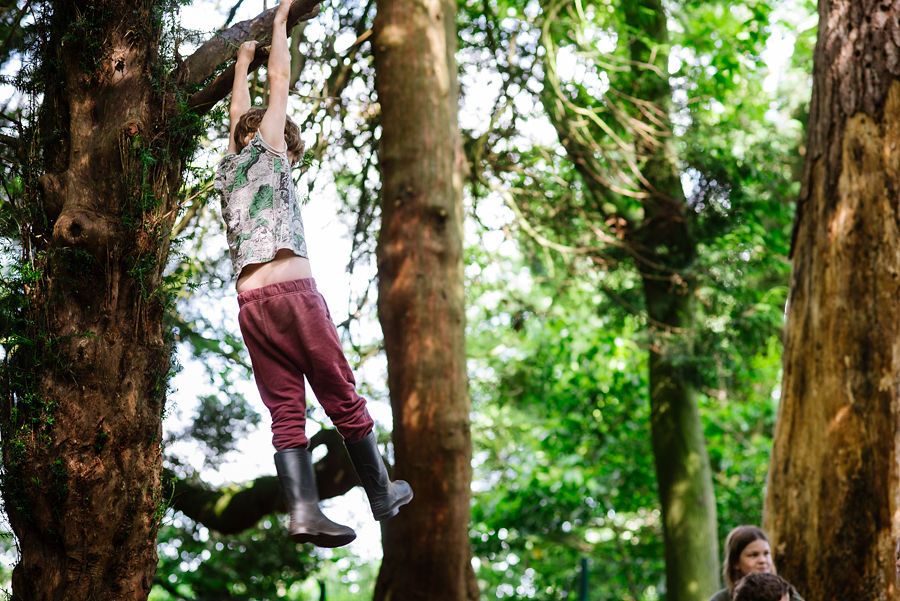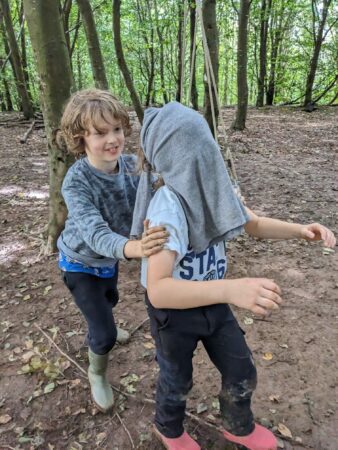
We often talk about risky play when we talk about Forest School so we thought we’d explore that in a bit more depth here. We believe it to be integral to what we do and a really important part of childhood development. We know that sometimes seeing your kids participate in risky activities can make your heart race and that the temptation is to urge them to stop but today we’re going to look at why we should be not only allowing, but encouraging, this kind of play.
What is risky play?
“Risky play is not the problem; it is the solution. It is through facing and overcoming risk that children develop the confidence and competence that is the foundation of resilience.”
Peter Gray, psychologist
Risky play is any kind of activity in which children and young people are taking risks and are making decisions that have an element of peril to them. It is the kind of play in which there is a risk that the child may get hurt (more on this later). Norwegian early childhood physical activity researcher, Ellen Sandseter, has identified eight categories of risky play through her research: height, speed, dangerous tools, dangerous elements, rough and tumble, getting lost, impact, and vicarious play.
What this looks like will differ massively depending on the individual and their abilities, age, and experience. For one child, risky play might be as simple as feeling confident enough to wade across a stream, for another it might be climbing high up a tree, for another it might be partaking in a particularly physical game with other children. At Forest School, activities of risky play are numerous and could include things such as using a knife to whittle, lighting the fire, building dens, exploring the woods, climbing trees, “rough housing” with their friends, even navigating the uneven terrain of a forest with tree stumps, brambles, fallen trees, holes….etc.
Benefits of risky play
Being able to play in a risky manner is a brilliant way for children to learn how to risk assess (often dynamically) and this is a fantastic transferable skill that they can take with them throughout their lives and apply to many other situations. Through risky play, children can learn to trust their bodies and to explore and push where their limits are. One day they might only reach a certain point in a tree but the next time they might be able to climb a little bit higher. One day they might not feel safe to use a hook knife to whittle a spoon, using instead to use a normal knife to make a butter knife. The next time they might feel confident enough (under supervision of course!) to try their hand at carving out the bowl of a spoon. Risky play is actually about learning to be safe through measured, assessed risk taking.
Taking risks boosts their self confidence, their self esteem and helps them to develop resilience. A child that has looked at a situation, identified the risk, given it a go and succeeded (maybe not always the first time) will feel proud of themselves and more encouraged to take risks with a beneficial potential outcome in the future. Many of the types of risks that they would take in an outdoor environment also help build physical skills such as coordination and gross and fine motor control.
Risky play is also fun! That sense of danger and rush of adrenalin is attractive to kids and providing risks are not carelessly taken or unsafe to others, they can increase the fun they’re having tenfold! It gives them an outlet for their energy, for their adventurous and ambitious ideas and games.

Managing risky play
So what is our role as adults when the young people we’re around are engaging in risky play? There’s a fine line to tread between trusting the children to know their own limits and bodies and letting them get hurt if we can see a real, likely danger.
As Forest School Leaders we try to lead by example, to encourage children to learn how to risk assess for themselves. We might ask open ended questions such as ‘what might happen if you run with sticks?’ or ‘do you think the branches up that high are strong enough to hold your weight?’ and we make sure to encourage good listening skills… ‘if your friend has asked you to stop, we need to listen to that’, or ‘do you think everyone is still enjoying this?’
We make sure we are always observing (from afar or more closely depending on the situation) and are ready to step in if we think there is a real danger that someone is going to get seriously hurt. But if a child does get hurt (and sometimes they do), that doesn’t mean risky play is a bad thing. In life, people get hurt and that is part of the learning process. Next time, the child will remember what decision led to that scraped knee or bump and will be more likely to adjust their behaviour to prevent a repeat occurrence.
Managing risky play is about being present and being observant but also about taking a step back and letting the children test out their limits to play, explore, grow and learn from their mistakes.
How do you feel about risky play? If you are a parent or work with children, we’d love to hear your thoughts on it, how you manage it, and maybe some examples of how risky play has led to some fantastic outcomes for the children you’re around. Leave us a comment and let’s keep the discussion going!
Author: Hannah Durdin, Content Officer & Forest School Leader
Date: Thursday 26th October 2023
Copyright © Outdoors Group Ltd 2021. All Rights Reserved.
Registered Office: The Outdoors Group, Western Lodge, Crediton, Devon, EX17 3NH. Company number 10755829
Terms & Conditions / Website Terms / Privacy Policy / Sitemap / Built with ♥ by Solve